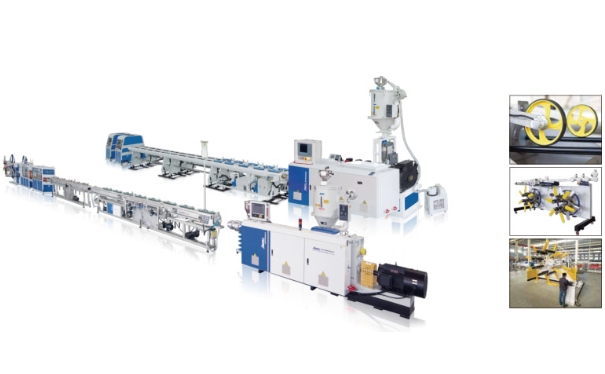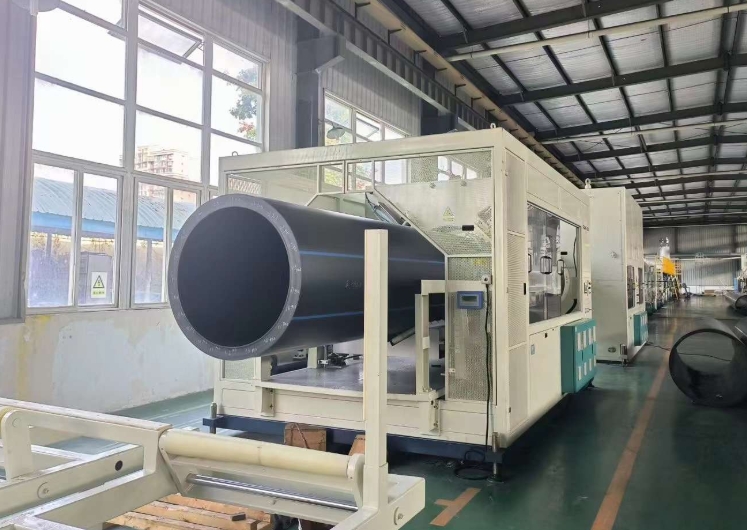Content Menu
● Understanding Pipe Extrusion Equipment Factories
● Key Factors to Consider When Evaluating Pipe Extrusion Equipment Factories
>> 1. Manufacturing Experience and Track Record
>> 2. Quality of Components and Engineering
>> 3. Customization and Flexibility
>> 4. Compliance with International Standards
>> 5. Advanced Control and Automation Systems
>> 6. After-Sales Support and Spare Parts Availability
>> 7. Cost Efficiency and Total Cost of Ownership
>> 8. Customer Reviews and Market Reputation
● Essential Components of Pipe Extrusion Equipment
● The Role of Process Parameters in Pipe Quality
● Evaluating Factory Capabilities: A Practical Checklist
● Common Applications of Pipe Extrusion Equipment
● The Importance of Tooling and Downstream Equipment
● Building a Long-Term Partnership
● Conclusion
● FAQ
>> 1. What are the most important components to evaluate in pipe extrusion equipment factories?
>> 2. How does factory experience impact the quality of pipe extrusion equipment?
>> 3. Why is compliance with international standards important when choosing a factory?
>> 4. What role does after-sales support play in the selection of pipe extrusion equipment factories?
>> 5. How can customer reviews help in selecting the right pipe extrusion equipment factory?
The global demand for high-quality pipes in sectors such as construction, agriculture, water management, and manufacturing has made the selection of pipe extrusion equipment factories a critical decision for businesses seeking to maintain a competitive edge. Choosing the right factory goes far beyond comparing price tags-it requires a thorough evaluation of technical capabilities, manufacturing standards, component quality, after-sales support, and the factory's overall reputation in the market. This comprehensive guide explores the essential factors you should consider when evaluating pipe extrusion equipment factories, ensuring your investment leads to reliable production, consistent product quality, and long-term operational success.

Understanding Pipe Extrusion Equipment Factories
Pipe extrusion equipment factories specialize in designing, manufacturing, and assembling the machinery used to produce pipes from materials such as PVC, PE, and other polymers. These factories play a pivotal role in the supply chain, as the quality of their equipment directly impacts the efficiency and output of pipe manufacturing plants. The right factory will not only deliver robust machinery but also provide technical expertise, customization options, and ongoing support to help you adapt to changing market demands.
Key Factors to Consider When Evaluating Pipe Extrusion Equipment Factories
1. Manufacturing Experience and Track Record
A factory's experience is a strong indicator of its reliability and ability to deliver high-performing equipment. Look for factories with a long-standing presence in the industry, a proven track record of successful installations, and a diverse portfolio that demonstrates expertise in various pipe extrusion technologies. Factories with decades of experience are more likely to have refined their processes, invested in advanced technology, and developed a deep understanding of customer needs[5][6].
2. Quality of Components and Engineering
The durability and performance of pipe extrusion equipment depend heavily on the quality of its core components, such as the extruder screw, barrel, gearbox, and control systems. Leading factories use components from reputable global brands, ensuring longevity, easy maintenance, and compatibility with industry standards. High-quality materials-such as bimetallic or nitrated steel for screws and barrels-are essential for withstanding the intense thermal and mechanical stresses of continuous operation[1][5].
3. Customization and Flexibility
Every pipe manufacturer has unique requirements regarding pipe diameters, wall thicknesses, materials, and output rates. The best pipe extrusion equipment factories offer customization options that allow you to tailor the machinery to your specific production needs. This flexibility extends to the design of die heads, calibrating tables, cutting units, and automation systems, ensuring you can efficiently produce a wide range of pipe products[2][6].
4. Compliance with International Standards
Adherence to international quality and safety standards, such as CE and ISO certifications, is non-negotiable. Factories that comply with these standards demonstrate a commitment to product safety, environmental responsibility, and consistent quality. This compliance is crucial for both operator safety and for ensuring that your finished pipes meet regulatory requirements in your target markets[6].
5. Advanced Control and Automation Systems
Modern pipe extrusion equipment relies on sophisticated control systems to monitor and regulate process parameters such as temperature, pressure, feed rate, and cooling. Factories that integrate advanced PLC (Programmable Logic Controller) systems and user-friendly Human-Machine Interfaces (HMIs) enable precise control, reduce human error, and facilitate real-time monitoring for consistent product quality[2][5][6].
6. After-Sales Support and Spare Parts Availability
The relationship with a pipe extrusion equipment factory should not end once the machinery is delivered. Reliable after-sales support-including training, technical assistance, maintenance services, and easy access to spare parts-is essential for minimizing downtime and ensuring smooth operation. Factories with responsive support teams and comprehensive warranties provide peace of mind and long-term value for your investment[5][6].
7. Cost Efficiency and Total Cost of Ownership
While initial price is a factor, it should not be the sole criterion. Consider the total cost of ownership, which includes energy efficiency, maintenance requirements, machine lifespan, and operational costs. Investing in higher-quality equipment from reputable factories often results in lower long-term expenses due to reduced downtime, fewer repairs, and higher production yields[6].
8. Customer Reviews and Market Reputation
Feedback from existing customers can offer valuable insights into a factory's reliability, product quality, and support services. Positive reviews and a strong reputation in the industry are indicators that a factory consistently meets or exceeds customer expectations. Seek out references or case studies that demonstrate successful installations similar to your own requirements[6].

Essential Components of Pipe Extrusion Equipment
Understanding the core components of pipe extrusion machinery helps in evaluating the capabilities of different factories. Key elements include:
- Extruder Screw and Barrel: Responsible for melting and mixing raw materials. Their design and material quality directly affect output consistency and machine lifespan[1][2].
- Gearbox: Transmits power efficiently and must be robust enough to handle continuous operation[1][5].
- Die Head: Shapes the molten material into the desired pipe profile. Precision engineering here ensures uniform wall thickness and dimensional accuracy[2][4].
- Calibrating Table: Cools and shapes the extruded pipe, maintaining its structural integrity[2].
- Cutting Unit: Trims pipes to the required length with precision, affecting production speed and waste management[2].
- Control System: Automates and monitors the entire process for consistent quality and operational safety[2][5][6].
The Role of Process Parameters in Pipe Quality
Even the best machinery can produce subpar pipes if process parameters are not properly controlled. Key parameters include:
- Extruder Die Surface and Temperature: Affects the smoothness and structural integrity of the pipe.
- Extruder Pressure: Ensures proper material flow and pipe density.
- Barrel Temperature: Critical for melting the material uniformly.
- Feed Rate (Take-off Speed): Influences wall thickness and overall pipe quality[3].
Factories that provide robust control systems and offer training on process optimization help you achieve consistent, high-quality output.
Evaluating Factory Capabilities: A Practical Checklist
When visiting or assessing pipe extrusion equipment factories, use the following checklist:
- Does the factory have a history of successful installations for your specific pipe type?
- Are the core components sourced from reputable suppliers?
- Is the machinery customizable to your production needs?
- Does the factory comply with relevant international certifications?
- Are advanced control and automation systems integrated?
- What level of after-sales support and spare parts availability is offered?
- How do existing customers rate the factory's products and services?
- What is the expected total cost of ownership over the machine's lifespan?
Common Applications of Pipe Extrusion Equipment
Pipe extrusion equipment factories serve a wide range of industries, including:
- Plumbing and Construction: Supplying pipes for water supply, drainage, and sewage systems.
- Agriculture: Producing pipes for irrigation and water management.
- Industrial Applications: Manufacturing pipes for chemical transport, cable protection, and more.
- Telecommunications: Creating conduits for electrical and fiber optic cables[2].
The ability to meet the specific requirements of these sectors is a testament to a factory's versatility and technical expertise.
The Importance of Tooling and Downstream Equipment
Beyond the main extruder, the quality of downstream equipment-such as calibration, cooling, and cutting systems-plays a significant role in the final product's quality. Factories that offer integrated solutions with well-matched tooling and downstream units ensure seamless operation and minimize the risk of production bottlenecks or quality defects[4].
Building a Long-Term Partnership
Selecting a pipe extrusion equipment factory is not just a one-time transaction; it is the beginning of a long-term partnership. The right factory will work with you to adapt to new market trends, develop custom solutions, and provide ongoing support as your business grows. Prioritize factories that demonstrate a commitment to innovation, continuous improvement, and customer satisfaction.
Conclusion
Choosing the right pipe extrusion equipment factory is a strategic decision that affects every aspect of your pipe manufacturing operation-from product quality and production efficiency to long-term profitability and market reputation. By focusing on manufacturing experience, component quality, customization options, compliance with standards, advanced control systems, after-sales support, cost efficiency, and market reputation, you can ensure that your investment delivers lasting value. The best factories are those that not only provide robust, high-performance machinery but also stand behind their products with comprehensive support and a commitment to your success.

FAQ
1. What are the most important components to evaluate in pipe extrusion equipment factories?
The most critical components include the extruder screw and barrel, gearbox, die head, calibrating table, cutting unit, and control system. These elements determine the efficiency, product quality, and durability of the machinery.
2. How does factory experience impact the quality of pipe extrusion equipment?
Factories with extensive experience have refined their manufacturing processes, invested in advanced technology, and developed expertise in meeting diverse customer needs. This results in more reliable equipment and better support services.
3. Why is compliance with international standards important when choosing a factory?
Compliance with standards such as CE and ISO ensures that the equipment meets safety, quality, and environmental requirements. It also facilitates market access and regulatory approval for your finished products.
4. What role does after-sales support play in the selection of pipe extrusion equipment factories?
Reliable after-sales support-including training, maintenance, technical assistance, and spare parts availability-minimizes downtime and ensures smooth, uninterrupted production, protecting your investment over the long term.
5. How can customer reviews help in selecting the right pipe extrusion equipment factory?
Customer reviews provide real-world feedback on product performance, reliability, and support services. Positive reviews and a strong reputation indicate that a factory consistently meets customer expectations and delivers quality equipment.






















